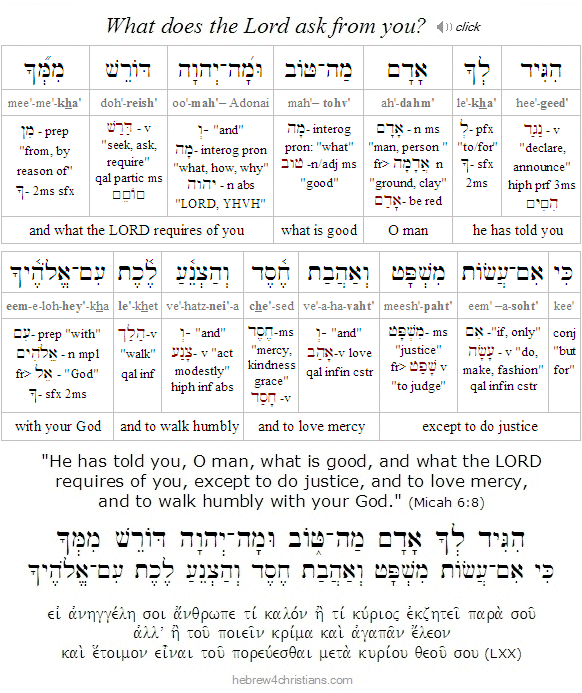|
THIS WEEK'S PARASHAH INCLUDES the following verse: "And now Israel, what does the LORD your God ask from you but only to fear (לְיִרְאָה) the LORD your God, to walk (לָלֶכֶת) in all His ways, to love (לְאַהֲבָה) Him, and to serve (לַעֲבד) the LORD your God with all your heart and all your soul?" (Deut. 10:12):
וְעַתָּה יִשְׂרָאֵל מָה יְהוָה אֱלהֶיךָ שׁאֵל מֵעִמָּךְ
כִּי אִם־לְיִרְאָה אֶת־יְהוָה אֱלהֶיךָ לָלֶכֶת
בְּכָל־דְּרָכָיו וּלְאַהֲבָה אתוֹ וְלַעֲבד אֶת־יְהוָה
אֱלהֶיךָ בְּכָל־לְבָבְךָ וּבְכָל־נַפְשֶׁךָ
ve·a·tah · Yees·rah·el · mah · Adonai · e·loh·hey'·kha · shoh·el · mei·ee·makh
kee · eem-le·yeer·ah · et · Adonai · e·loh·hey'·kha · lah·le'·chet
be·khol · de·rah·khav · ool·a·ha·vah · oh·toh · ve·la·a·vohd · et · Adonai
e·loh·hey'·kha · be·khol-le·vav·kha · oov·khol-naf·she'·kah?

"And now, O Israel, what does the LORD your God require of you,
but to fear the LORD your God, to walk in all his ways, to love him,
to serve the LORD your God with all your heart and with all your soul?
(Deut. 10:12)
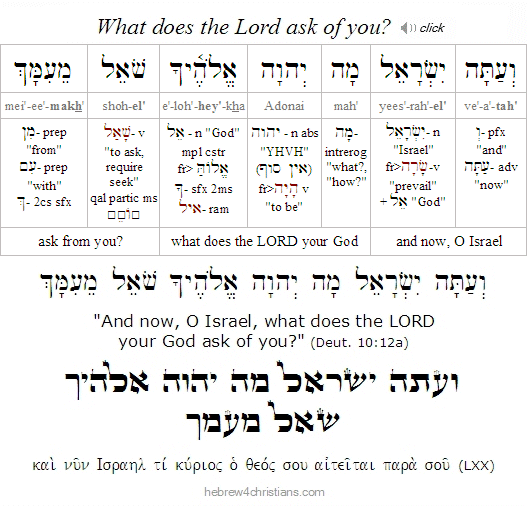
Traditional Judaism believes in personal responsibility as expressed through the exercise of the human will. This is summarized in the well-known maxim of the Talmud: "All is in the hands of God except the fear of heaven" (Berachot 33b; Niddah 16b). In his commentary on the verse quoted above, Rashi noted that when God asked Israel "only to fear" Him, this implied that He voluntarily withdrew His sovereign control over human beings so that no one would be overwhelmed or "forced" into serving Him. God gives to each soul the path of goodness (that leads to blessing) and the path of wickedness (that leads to curse). Paradoxically, we are "forced" to freely choose whether to live as a tzaddik (righteous person of faith) or as a rasha (idolatrous person of unbelief) -- and we cannot not choose! Ultimately, the choice whether or not to turn to God is the only real one we have, since it determines everything else we see and do...
It is interesting to note that the sages of the Tosafot (i.e., the commentary found on the outer margin and opposite Rashi's notes in the Talmud) quote a different statement regarding this verse: "All is in the hands of Heaven except for thorns (tzinim) and snares (pachim)." This apparently comes from the Book of Proverbs: "Thorns (צִנִּים) and snares (פַּחִים) are in the path of the perverse; (but) he who guards his soul will distance himself from them" (Prov. 22:5).
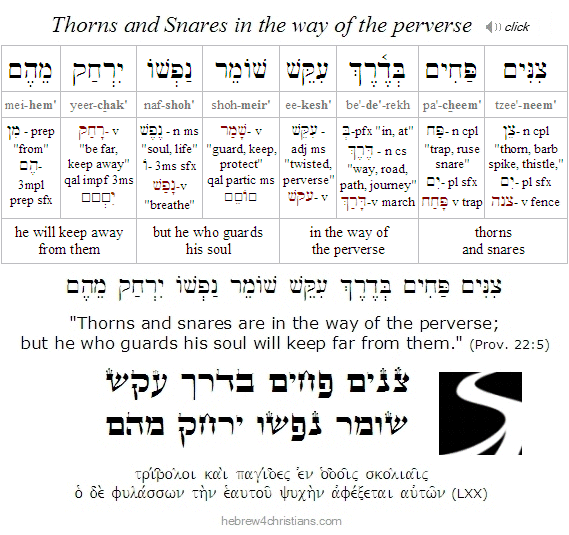 |
R' Yaakov said, "This world is like a corridor before the World to Come; prepare yourself in the corridor, that you may enter into the hall" (Pirke Avot 4:21). God sets "thorns and snares" within the "corridor" here to test us in our way. If we are perverse, we will find ourselves injured and stuck through various circumstances of our own making. The one who "guards his soul," however, will steer clear of these things and therefore be spared much tzuris and heartache. This is consonant with the teaching of the New Testament: "Do not be deceived: God is not mocked, for whatever one sows, that will he also reap" (Gal. 6:7). Our moral choices do indeed matter and affect our experience of life. Some things, such as our DNA, our intelligence, the conditions that surround us in history, and so on, are indeed beyond our control, but we all nonetheless face "thorns and snares" to circumnavigate if we are to turn away from perversity and guard our souls, as the Proverb instructs.
What the LORD asks from us is simply the impossible, since the human heart is unable to truly love and serve the LORD apart from intervening grace (Eph. 2:1-10). The real miracle of faith is found in a transformed heart. It is never a question of "willpower" or the "zeal" of man; no - it is never a question of what I can do but rather what God can do (John 1:13).
דרך־מצותיך ארוץ
כי תרחיב לבי
de'·rekh -meetz·vo·tey'·kha · a·rootz
kee · tar·cheev · lee·bee

"I will run the way of your commandments,
for you enlarge my understanding."
(Psalm 119:32)

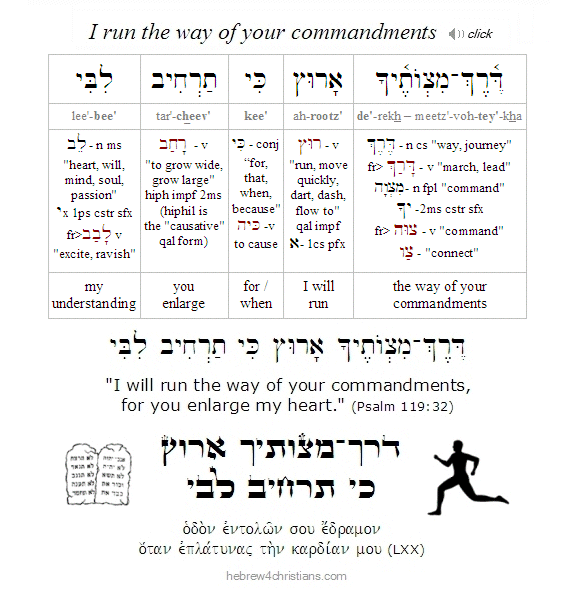
However, it seems to be the pattern of God's grace to bring affliction and trouble into our lives so that we will begin to seek the Presence of God. After all, how many of us came to know the LORD apart from the pain that comes from apprehending our own inner brokenness? "Truly, truly, I say to you, unless a grain of wheat falls into the earth and dies, it remains alone; but if it dies, it bears much fruit" (John 12:24). The hard "outer shell" of the seed must be broken so that the life of the Spirit can come through... The commandment to love the LORD, then, only finds its voice after we come to faith, after we experience the Holy Spirit's power, indeed, after we are made alive from the dead.... The ultimate aim of the various "thorns and snares" of life, then, is to "wake us from our slumbers" to reveal the way of life... As C.S. Lewis once said, "God whispers to us in our pleasures, speaks to us in our conscience, but shouts in our pains: It is His megaphone to rouse a deaf world."
 |
Keep pressing on, chaverim! God in His infinite wisdom uses troubles and brokenness in our lives so that we can make the only choice that really matters: to turn to Him for healing.
שָׁמְרֵנִי אֵל כִּי־חָסִיתִי בָךְ
אָמַרְתְּ לַיהוָה
אֲדנָי אָתָּה טוֹבָתִי בַּל־עָלֶיךָ
shom·rei'·noo · El · kee · cha·see'·tee · vakh
a·mart' la-Adonai, A·do·nai a'·tah,
to·va·tee · bal - a·ley'·kha

Guard me, O God, for I seek refuge in You.
I say to the LORD, "You are my Lord;
I have no good apart from you"
(Psalm 16:1-2)
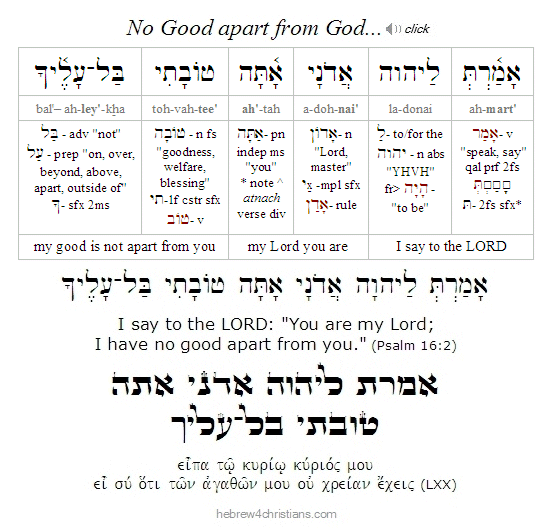
"It is for You and not for me that I stand before You..." Everything we receive is through God's chesed, His love and grace...
Note: For more about this subject, please see "Paradox and Presence."
<< Return
|









